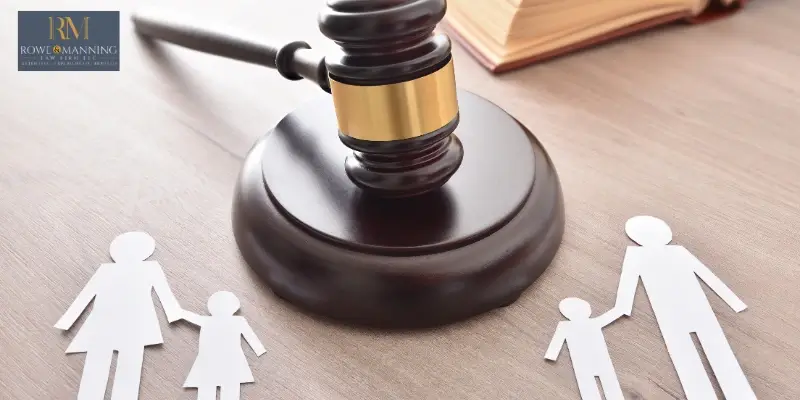What Do Judges Look for in Child Custody Cases in Louisiana? (2025)

Some people aren’t sure what the court will prioritize during a child custody dispute. Many parents ask, “What do judges look for in child custody cases in Louisiana?” The answer can decide how much time you get with your child. If you’re preparing for a custody dispute, this issue is important.
Family Law Attorneys in Louisiana
At Rowe & Manning Law Firm LLC, we work through Louisiana family law cases with skill. We have helped clients across the state for over 15 years. Our team brings decades of combined experience across multiple practice areas. We work to support local families both in and out of court.

Why Choose Us?
We work hard for every client at Rowe & Manning Law Firm LLC. Our team aims to solve problems in a way that works for your family long-term. We provide strong legal support without unnecessary delay. We’re experienced in family law, but we also bring insight from other legal fields.
Interest of the Child
Every Louisiana child custody case starts with the same rule. The court has to do what protects the child’s interests. Civil Code Article 134 lists factors that the judge may use to decide this.
No parent gets different treatment because of gender. A father and mother have equal standing under the law. Judges look at how each parent supports the child’s development. They also weigh the parent’s willingness to support the child’s relationship with the other parent.
About 23.3% of Louisiana’s population is under age 18. That’s over one in five people. With such a high percentage of young children, courts see custody as a regular part of family law.
An experienced Louisiana family lawyer can explain how this standard applies to your case.
Common Factors in Custody Cases
Judges consider a number of specific facts when deciding where a child should live. They focus on:
- Emotional bonds. It helps if your child has a strong relationship with you. This includes your role in daily activities like schoolwork. It shows you’ve consistently cared for them.
- Parental fitness. Each parent’s health is important. A parent with stable work and housing usually scores better.
- Child’s current environment. Judges try not to disrupt the child’s life. The only exception is if staying would harm the child.
- Ability to co-parent. Louisiana courts support joint custody when possible. That means you’ll need to show you can cooperate. This applies even if you disagree with your co-parent.
- History of neglect. Any proven record of abuse or neglect can lead to restrictions. It can even result in a complete loss of custody.
In about 67.3% of Louisiana households, the homes are owner-occupied. Judges often view stable housing as a sign of long-term commitment to the child’s care.
If you are unsure how your background might be seen by a judge, a Louisiana custody lawyer can assess your options.
Impact of Criminal History
A criminal record can damage your case. This is especially true if the charges involve violence or drugs. Even old convictions might come up in court. They might reflect on your ability to keep the child safe.
Substance misuse has a major role in custody decisions. If you’re in recovery, bring records that show progress. Without clear proof that the problem is under control, the court can deny custody. Sometimes, a judge might award only supervised visits.
Domestic violence almost always leads to restrictions. This can be done against a partner or a child. In these situations, even a strong parenting history can’t outweigh safety concerns. A Louisiana domestic violence lawyer can explain how courts handle abuse-related custody issues.
Sole Custody vs. Joint Custody
Louisiana courts lean toward joint custody. That means both parents share rights. Judges only grant sole custody when one parent cannot meet the child’s needs. It’s also reserved for when one parent is a threat to their child’s well-being.
In joint custody, one parent is usually named the “domiciliary parent.” That means they decide where the child lives. The other parent still has rights. However, they may have limited input on major decisions.
Sole custody is rare. You need strong evidence that the other parent is unwilling to co-parent. The median household income in Louisiana is $60,023. Not having a stable income might be considered evidence that a parent is unfit.

FAQs
Q: What Makes a Father Unfit for Custody in Louisiana?
A: What makes a father unfit for custody in Louisiana is evidence. Judges don’t assume a father is unfit without proof. To be declared unfit, the court must find that the father puts the child at risk. This can include a pattern of abuse. Other behaviors can affect the child’s safety and development.
Q: How Do I Win Full Custody in Louisiana?
A: To win full custody in Louisiana, you need to show that joint custody would harm your child’s well-being. Louisiana courts start with the assumption that children benefit from having both parents involved. Full custody, otherwise known as sole custody, is usually reserved for serious safety issues. It applies in situations where a parent is unwilling or unable to parent safely.
Q: What Looks Bad in a Custody Battle?
A: What looks bad in a custody battle is anything showing that a parent puts their own interests ahead of the child. If you attack the other parent, it hurts your case. So does trying to block contact between the other parent and the child without cause. Evidence of unstable living arrangements can also raise concerns.
Q: What Is the Definition of an Unstable Parent?
A: An unstable parent is one who cannot provide a safe environment. Many different circumstances can lead to instability, like illness or financial trouble. This behavior can create emotional stress for the child. For example, if a parent moves homes several times in one year, a judge may call that unstable.
Show What the Court Wants to See
Your child’s well-being is what matters most. By knowing what a judge looks for, you’ll be better prepared to support your family’s future. You get one chance to make a strong case. Schedule a consultation with Rowe & Manning Law Firm LLC to discuss your case in confidence.

